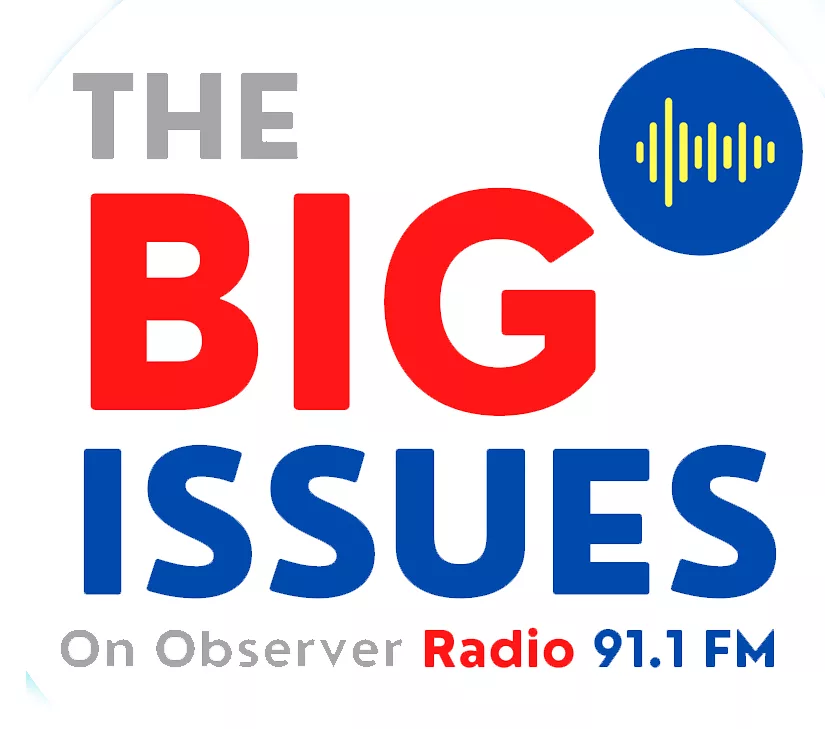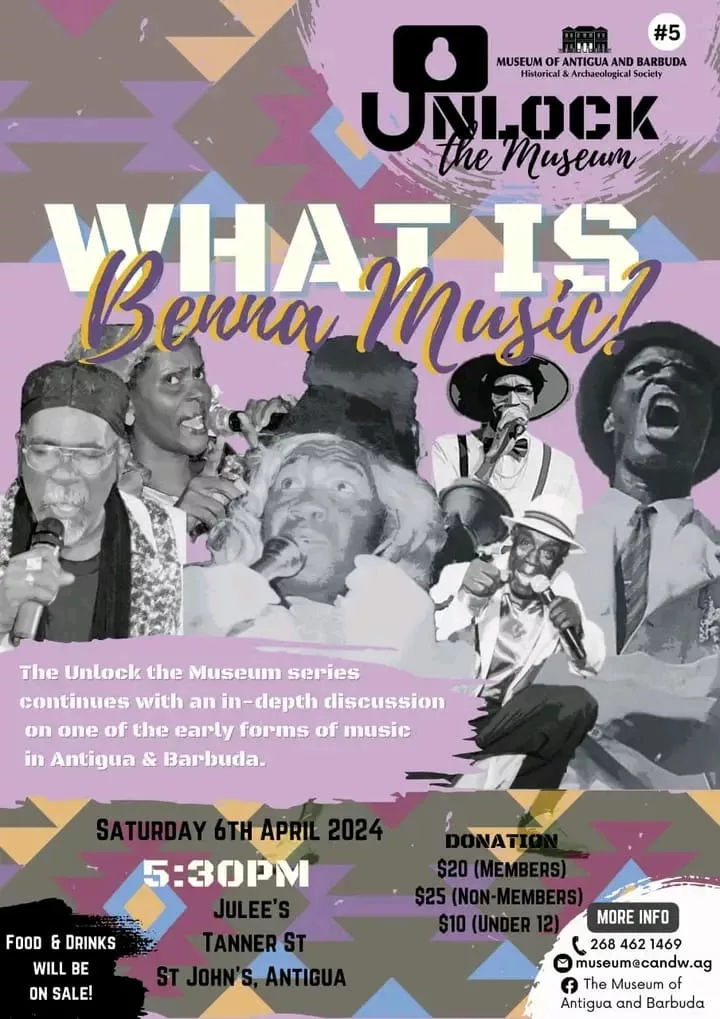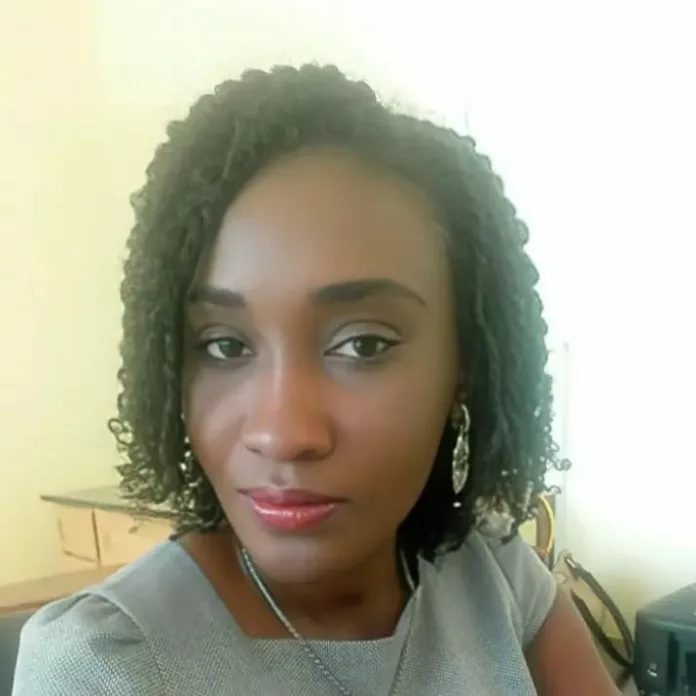
By Barbara Arrindell
Benna music sweet fa so. Although few will disagree, Benna found itself locked out of certain circles and situations. Today, Saturday April 6 2024, Benna steps up and takes its rightful place in history as scholars, musicians and calypsonians gather to share their knowledge and understanding of Benna with the general public.
The event is hosted by the Museum of Antigua and Barbuda and will be held at Julee’s this evening.
One of the presenters will be Dr Hazra Medica, Cultural Advisor in the Ministry of Education, Sports, and Creative Industries. I asked her to tell us a bit about her background and her link to Benna.
Dr Medica: I have a background in journalism (hard news and features writing), prose fiction writing, and literary (written and oral traditions) and cultural studies. My almae matres include: Golden Grove Primary, Antigua Girls High, Antigua State College (A’ Levels and first year undergrad), University of the West Indies, and the University of Oxford. My MA research investigated the role of election calypsos in political parties’ campaigns.
My DPhil (PhD) research at Oxford examined Antiguan narratives’ peculiar engagements with questions of identity. It drew largely upon the works of four writers—Jamaica Kincaid, Joanne C Hillhouse, Marie-Elena John and Frieda Cassin—and selected calypsonians including Queen Ivena and King Short Shirt.
Barbara: You’re our Cultural Advisor, what does the job entail?
Dr Medica: As Cultural Advisor, my two most recent projects are: a national cultural industries mapping project, and an intangible cultural heritage safeguarding project (ongoing), as assisted by the UNESCO IFCD and ICH Fund respectively. The outputs of these projects are designed to enhance the available cultural infrastructure and provide impeccable roadmaps/guides for unprecedented propulsion of the creative/cultural industries, and the safeguarding of intangible cultural heritage.
Barbara: Why is Benna music an important part of our culture? How has it contributed to our development?
Dr Medica: Benna music is considered the precursor to our calypso tradition. Benna was considered ‘bawdy’ and subversive; it was not a genre that was well-regarded by society. Benna songs unveiled the hidden, publicised topical “scandals” and the perceived wrong-doings/hypocrisies of “high society” and those in positions of authority.
We would all be familiar with the name John Quarkoo, the 1940s “town-crier”, and the trouble that lyrics of his Benna songs often brought him. (“Trouble” included jail time.)
We certainly can see Benna’s subversive grin and reflection, and even its mass appeal, despite criticism, in our calypso tradition.
Interestingly, re-presentations of Benna music in our literature, as well as interviews and informal conversations that I have had with our calypso enthusiasts and legends highlight that Benna music, over time, came to refer to any genre that was not “church/Christian music”. This is why in Kincaid’s famous short story “Girl”, the unnamed girl character responds defensively to her mother: ‘but I don’t sing Benna on Sundays at all and never in Sunday school’.
Barbara: How does the event being put on by the museum impact or intersect with your work as Cultural Advisor?
Dr Medica: I consider the museum an invaluable partner in the documenting and safeguarding of our cultural heritage. The institution has long been very supportive of the work I do and, along with other partners in heritage, we always aim to collaborate to improve the efficacy of information sharing and exchange between cultural and creative actors and stakeholders, and the general population. Duplication of efforts and programmes only serve to put a strain on already limited resources.
Barbara: Was Benna music unique to Antigua and Barbuda?

Dr Medica: With everything Caribbean, there are always shared similarities alongside differences. So, to be sure, other countries would have what they identify as their traditional music or a precursor to their modern music/calypso.
Perhaps our traditional music and theirs might share certain themes, and perhaps there might be some dispute over the “true” origin of certain lyrics. Perhaps tempos and modes of publication might differ, but “Benna”, its history, its evolution, its local references, our engagement with it, and how it helped to shape or express our worldview is uniquely ours. It has been identified as such (ours) and “nobody go run” we from identifying it as such. Then again, it all goes back to how you define Benna. If Benna refers/referred to secular music, that’s another musical story.
Barbara: You alluded to it before, but culturally speaking what’s the value of Benna and then the music that came after, calypso? How have they both shaped our lives?
Dr Medica: Benna, with Quarkoo, for example, as town-crier, was useful for communicating information to the masses. It was the “people’s newspaper”. It undertook an important social role, creating a sense of community with its publicising of local events, and dissent even.
Belonging to a group/nation and the accompanying sense of “being smaddy” are significant. We have to locate Benna and calypso in the context of the amnesia that was historically forced or thrust upon the masses and their/our ancestors.
Benna and calypso have played important political functions (protest… interrogation of authority figures and national policies… overall being an unofficial opposition party). Calypso has functioned to rally support for nation-building as well as to express/ organise dissent against ills that hamper our journey towards self-autonomy and meaningful (and sustainable) independence.
It has been echoed many times that we are not a “reading public”. I know that not to be entirely true, but more than that I know that we need to interrogate our idea of “reading”. We need to question the privileging of the written over the oral, which goes against our actual lived realities.
Consider how many Antiguan and Barbudan writers there are and how many written works per year. Then consider the same for calypso. Consider the diverse voices of protest, voices calling for togetherness, voices asserting who we are as a people and that we matter in a world in which we are but dots, if even that.
Consider how we quote our Kings and Queens– the official and the people’s choices. ‘As Boldface said…’ ‘Latumba min sing…’ and on and on, demonstrating that our singers within the Benna and calypso traditions have had an impact in articulating our world view and helping us to locate ourselves.
The Benna and calypso traditions have given us authors, philosophers, and pilots/guides who have allowed us exploratory journeys to ourselves and identities that others have tried and continue to try to deny us. I know I met calypso long before I met book.
Barbara: Finally, for people who are only now hearing about the event to be hosted by the museum today Saturday, why should they attend? Who will they be hearing from and what will the average person gain by listening to presentations on Benna?
Dr Medica: From my end, I would say, the average person will gain a greater sense of self, our journey to this point, why certain issues remain important to us, and why they will perhaps resonate for a longer time still.
The panellists are coming from diverse backgrounds, with diverse engagements with and participation in Benna and calypso. The audience will hear similar and different viewpoints expressed in a respectful and meaningful manner.
It’s not every day you get all of the above. So people should turn up in enthusiastic numbers for the discussion.

